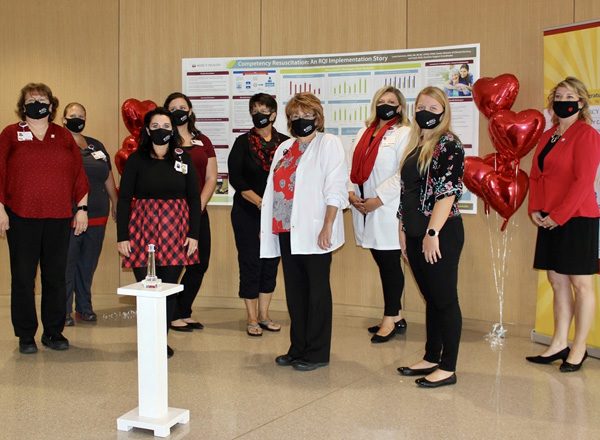Mercy Health Muskegon embarked on the journey of transitioning from classroom to verified competence using the Resuscitation Quality Improvement (RQI) program, a program co-developed by the American Heart Association and Laerdal Medical, in 2017. To address the challenges of supporting the maintenance of high-quality CPR skills, Mercy Health Muskegon partnered with RQI with the desire to ultimately improve patient outcomes.
Mercy Health Muskegon, which is part of Trinity Health Catholic Health System, is a non-profit health care system serving the Grand Rapids, Muskegon, Lakeshore and surrounding communities. As the largest employer in the community, colleagues go above and beyond every day. The health system includes 5 hospitals, 60+ physician offices, 1,300+ medical staff physicians, 800+ hospital beds and 7,200+ colleagues.
Linda Dunmore, MSN, RN, NE-BC, CPHQ, CPHS, senior director of Clinical Services, and Kayla Kieft, decision support coordinator led the implementation within the hospital system.
"Mercy Health Muskegon is committed to adopting best practices and continually improving resuscitation quality that promotes positive patient outcomes," said Dunmore. "Our clinicians are skilled in the latest practices in resuscitation, maintaining competency on a quarterly basis at the RQI manikin station, helping our patients have a greater chance of survival and recovery from cardiac arrest. This recognition is a testament to the work and the dedication of our entire clinical team."
A nurse within the hospital system shared how it wasn’t easy to adapt to the new concept, but ultimately moving from bi-annual training to quarterly training helped keep skills fresh.
“When we found out we had to do CPR more frequently using RQI, we weren’t looking forward to the change. I changed my mind as we started using it. CPR has changed so much in my 34 years as a nurse that it is nice to keep the changes fresh in my mind. I especially was thankful for RQI when I had to perform CPR at home. It was a lot quicker to remember the changes.”
With the help of the RQI Partners team, Mercy Health Muskegon found significant value in staff learning outcomes. They developed a transition plan from classroom to verified competence specific to BLS, ACLS, and PALS, transitioned from the classroom setting method to teach BLS, ACLS, and PALS to a competency model with regularly assigned modules and strategically deployed manikin stations within hospital locations to allow for ease of colleague access and timely completion of quarterly skills training modules.
Educators shared how the analytics data helped to recognize and enhance improvements in skill sets.
“Several of our staff have reported they feel much more confident with RQI than the previous BLS process. We had a code blue in our department, and I heard from 2 RNs and 1 PCA that RQI made them much more confident and prepared. We hear great feedback!”
The organization reported improved patient outcomes and saved time by eliminating multiple manual lists of certifications for various disciplines using digital electronic list distribution from an LMS platform.
Since implementing RQI, Mercy Health Muskegon has consistently shown how it values the importance of high-quality CPR competence, performance, and delivery of saving more lives. Their commitment to mastery learning is why the organization is a newly inducted RQI Lighthouse organization. As an RQI Lighthouse organization, Mercy Health Muskegon joins an exclusive group of national hospitals that demonstrate a commitment to mastery learning and improving patient outcomes through best practices of resuscitation programs.
You can view Mercy Health Muskegon’s full RQI implementation story from policy development, ventilation scoring, survey results, and their organization's next steps here.







